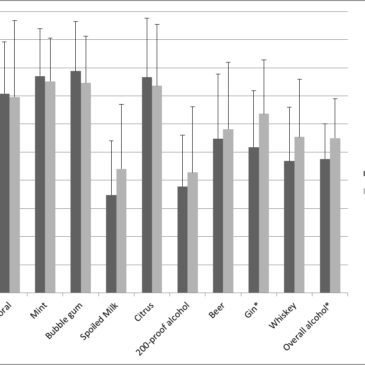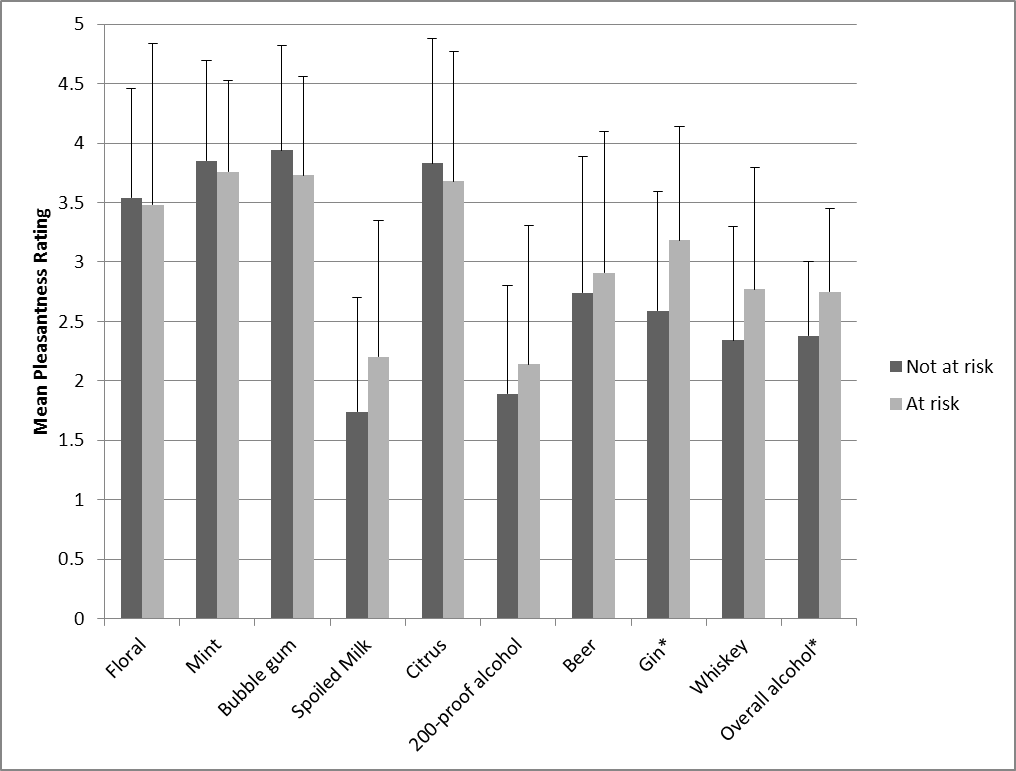Babies exposed to alcohol in the womb are at risk for having growth defects and neurological problems (e.g., Streissguth, Barr, & Sampson, 1990). Children exposed to alcohol prenatally also begin drinking alcohol earlier than others (Baer, Sampson, Barr, Connor, & Streissguth, 2003). However, the exact pathway between prenatal alcohol exposure and early onset drinking is unclear. It could be that prenatal exposure to alcohol changes children’s sensitivity to alcohol, which might be reflected in perceptions of smell. This week, as part of our Special Series on Motherhood and Addiction, we review a study that investigated how children with prenatal alcohol exposure identify and perceive the odor of alcohol and other substances (Hannigan, Chiodo, Sokol, Janisse, & Delaney-Black, 2015).
Methods
- The researchers initially recruited a sample of urban African American mothers who had children between September 1, 1988 and August 31, 1991 (n=656).
- For the current study, the researchers recruited a sample of 18- to 19-year old offspring from this cohort (n=75; 38.7% male).
- The researchers excluded daughters who were pregnant.
- The researchers studied the mothers’ drinking habits and determined whether each participant was at-risk for prenatal alcohol exposure.
- The researchers presented participants with 10 scents and asked them to identify and rate the pleasantness of each odor using a 5-point Likert scale.
- They studied whether participants at-risk for prenatal alcohol exposure differ from others in (1) their ability to identify smells and (2) the extent to which they perceive alcohol odors to be pleasant.
- The researchers statistically controlled for participants’ own drinking to make sure that any differences they observed were due to differences in prenatal alcohol exposure, not current drinking. They also controlled for participants’ basic olfactory functioning.
Results
- There was no measurable difference in specific odor identification between at-risk and not at-risk groups. However, at-risk participants identified fewer odors correctly overall.
- Overall, as Figure 1 indicates, at-risk individuals rated gin and alcohol odors as more pleasant than did their counterparts. These effects were statistically significant.
- This result held true even when accounting for participants' own drinking habits. At-risk participants found alcohol odors more pleasant but not because they drank more alcohol than others.
Figure 1. Perceived pleasantness of odors to participants with and without prenatal alcohol exposure (Differences marked with asterisks are statistically significant; Modified from Hannigan et al., 2015.) Click to enlarge.
Limitations
- It is difficult to separate the influence of prenatal alcohol exposure from the influence of early childhood environment.
- The small sample size limits detection of other factors that might affect odor perception.
- The study design does not account for confounding factors such as genetic susceptibility. It is possible that mothers passed down differences in odor perception and drinking habits to their children partly through genetics, rather than only through drinking behavior during pregnancy.
Conclusion
This study is one of the first to investigate the relationship between prenatal exposure to alcohol and how people experience the smell of alcohol and other odors. The results suggest that individuals who are exposed to alcohol prenatally find alcohol to be more pleasant-smelling than individuals without as much exposure. This is true even when accounting for individuals’ personal drinking habits. These changes in smell could help explain why people exposed to alcohol prenatally begin to drink earlier. Further research is needed to discern the biological mechanisms of these differing responses to alcohol odors.
-Jed Jeng
What do you think? Please use the comment link below to provide feedback on this article.
References
Baer, J. S., Sampson, P. D., Barr, H. M., Connor, P. D., & Streissguth, A. P. (2003). A 21-year longitudinal analysis of the effects of prenatal alcohol exposure on young adult drinking. Archives of general psychiatry, 60(4), 377-385.
Streissguth, A. P., Barr, H. M., & Sampson, P. D. (1990). Moderate prenatal alcohol exposure: effects on child IQ and learning problems at age 7 1/2 years. Alcoholism: Clinical and Experimental Research, 14(5), 662-669.





